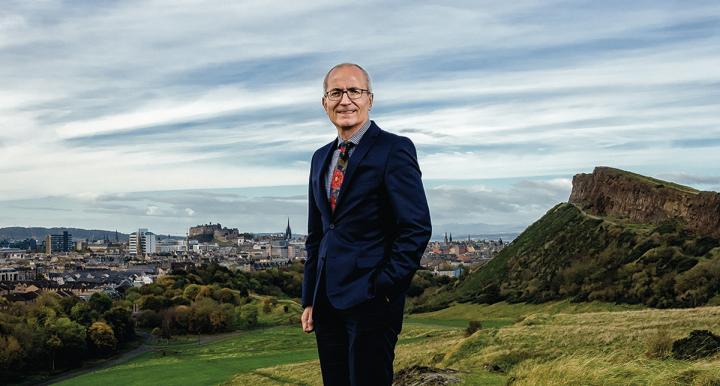Backing a life-changing investment for the whole community
On 20 July 2017, the University was one of several signatories to what could be one of the most significant events in its 434-year history.

The Edinburgh and South East Scotland City Region Deal pledged £1.1 billion to fund major infrastructure projects in Edinburgh, the Lothians, Fife and the Scottish Borders. The money will come from the Scottish and Westminster governments and partners in the local authorities, universities and private sector.
Driving data innovation
The ambition is to make Edinburgh and its surrounding area ‘the Data Capital of Europe’. By developing clusters of activity based upon data science – the collection, organisation and interpretation of large sets of digital information – the University will be key to achieving the City Region Deal’s goal.
“In many ways, the University is the glue that holds the whole thing together,” says Senior Vice-Principal Charlie Jeffery, who represented the higher education sector in the negotiations. “We have a vision and capacity for technological innovation that can change and drive the economy.”
“The funding gives us both the opportunity and the huge challenge to deliver on our potential,” says Vice-Principal Planning, Resources and Research Policy, Professor Jonathan Seckl. “It is intended to facilitate necessary and beneficial change in how we do things, how we engage with our city and impact on Scotland and the wider world.”
The University is dedicated to data innovation in both teaching and research. For example, it is home to Europe’s highest-ranking School of Informatics. Its world-class research in machine learning, robotics, computer science and artificial intelligence has spawned some 100 companies in recent years.
Improving services and care
More sophisticated use of data allows better understanding and prediction of trends and behaviour, leading to improved services. One example of this can be found in University researchers’ work with diabetes patients at the University’s Usher Institute. Experts used vast data sets to ensure patients receive the best possible care at all points of contact within the NHS in Scotland. The work has significantly reduced the disease’s harshest effects: blindness is reduced by 40 per cent and amputations by 42 per cent.
This university has been in the city, doing great things, for several hundred years combining our strengths with that of the region, to create something new, something very valuable.
Boosted by the City Region Deal, these existing data science practices will be scaled up and new ones developed. The process will change the University at both an operational and cultural level.
There will be three main emphases, according to Professor Seckl: “Outward-looking researchers; talent generation; and industrial and public sector partners in the same place, breathing the same air.”
The deal will facilitate these three areas by investing in major capital projects that will give a home to researchers, students and industries working on data-driven innovation. An example of this can already be seen in the recently created Bayes Centre, which will house computer scientists, engineers, mathematicians and industry colleagues working on fundamental computer and data science. Major partners such as Intel and Silicon Graphics are already lined up to move in to the building, on its completion in 2018.
In 2021, the Edinburgh Futures Institute will take up residence in the former Royal Infirmary and will pioneer how data can be used in the creative industries, financial sector, government and education.
The Usher Institute – working on health and social care data to improve care – currently exists virtually but the City Region Deal will give it walls.
The National Robotarium – a partnership with Heriot-Watt University – will see advances in robotics, while staff working on the University’s Easter Bush campus will work with environmental, genomics and genetic data, vital for improving agriculture.
“This is moving the University away from the traditional model of buildings in which academics and students mingle, but live their working lives apart from the rest of our city region,” explains Professor Seckl. “It should be where students are rapidly exposed to the working world, to jobs and innovation.”
Skills for life
The City Region Deal will further generate talent through lifelong education in the skills needed for the data-driven economy, a sector that could be worth $2.7 trillion in 2020, according to the International Data Corporation.
“This can’t just be growth that simply benefits those who were already doing well,” states Professor Jeffery. “It must be growth that is available to all. We have developed a strong emphasis on inclusion, making sure everyone across the region has a chance to develop those skills.”
The demand for workers with digital skills in Scotland is 11,000 a year. However, only 4,000 a year are currently being produced. The University is working to ensure that the opportunities of the data-driven economy are available to everyone, at all stages of their career.
“We are looking at skills for the data economy across the life-course,” explains Professor Jeffery. “We are looking at everything: how to adapt teacher training from primary school upwards; resources for primary and secondary schools; new forms of cooperation with colleges and other universities; and new ways of supporting on-the-job retraining and upskilling.”
Goals set by the City Region Deal include training 100,000 people to flourish in the data economy over the next 10 years, and the creation of 40,000 to 50,000 new jobs. Datalab, an innovation centre hosted by the University, has an important role to play, offering business development support and training opportunities to both start-up and established businesses.
“In a sense, the City Region Deal is an opportunity to renew that civic tradition on which the University was founded,” says Professor Jeffery. “This university has been in the city, doing great things, for several hundred years combining our strengths with that of the region, to create something new, something very valuable. The City Region Deal has the potential to be one of the landmarks in that centuries-long history.”
Photo © Tricia Malley Ross Gillespie www.broaddaylightltd.co.uk

